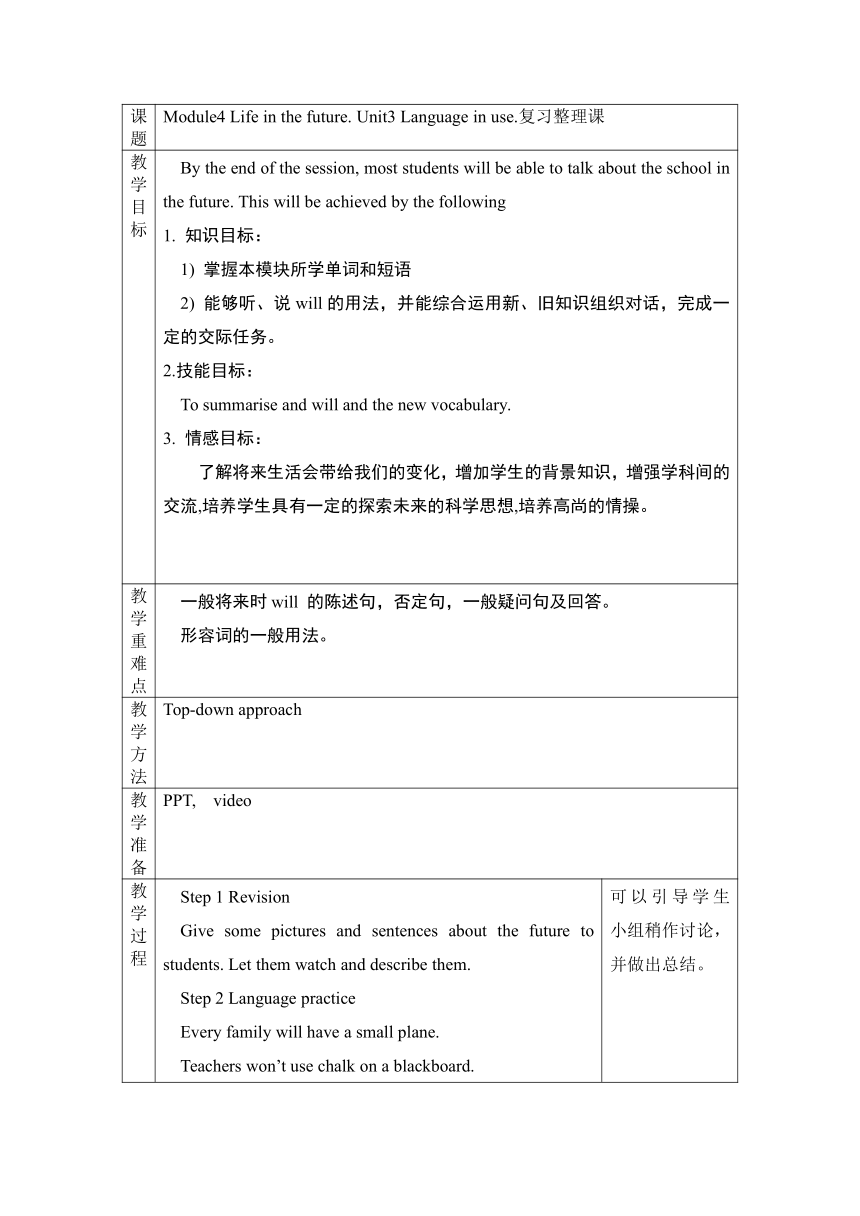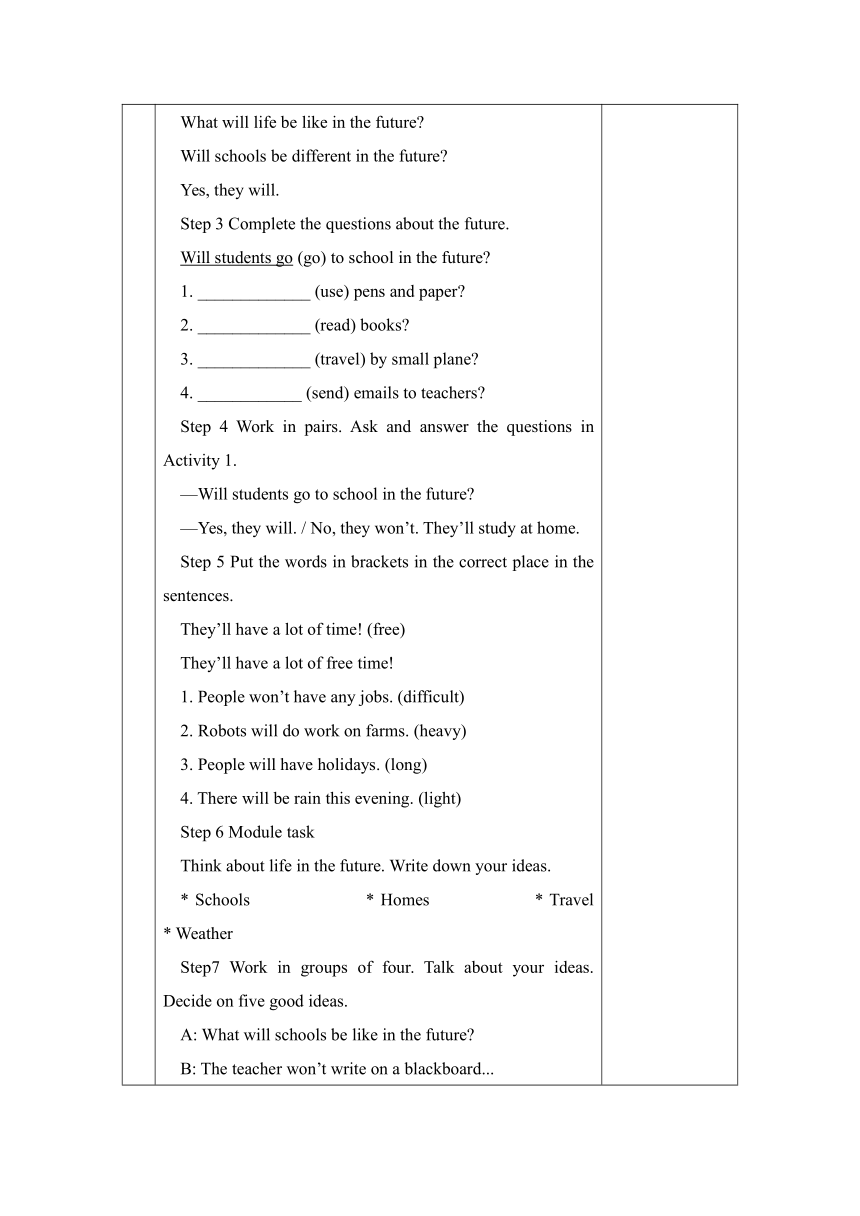Module 4 Life in the future.Unit 3 Language in use.表格式教案
文档属性
| 名称 | Module 4 Life in the future.Unit 3 Language in use.表格式教案 |

|
|
| 格式 | zip | ||
| 文件大小 | 39.5KB | ||
| 资源类型 | 教案 | ||
| 版本资源 | 外研版 | ||
| 科目 | 英语 | ||
| 更新时间 | 2018-06-14 20:17:26 | ||
图片预览


文档简介
课题
Module4 Life in the future. Unit3 Language in use.复习整理课
教学目标
By the end of the session, most students will be able to talk about the school in the future. This will be achieved by the following
1. 知识目标: 1) 掌握本模块所学单词和短语
2) 能够听、说will的用法,并能综合运用新、旧知识组织对话,完成一定的交际任务。
2.技能目标:
To summarise and will and the new vocabulary.
3. 情感目标: 了解将来生活会带给我们的变化,增加学生的背景知识,增强学科间的交流,培养学生具有一定的探索未来的科学思想,培养高尚的情操。
教学重难点
一般将来时will 的陈述句,否定句,一般疑问句及回答。
形容词的一般用法。
教学方法
Top-down approach
教学准备
PPT, video
教学过程
Step 1 Revision
Give some pictures and sentences about the future to students. Let them watch and describe them.
Step 2 Language practice
Every family will have a small plane.
Teachers won’t use chalk on a blackboard.
What will life be like in the future?
Will schools be different in the future?
Yes, they will.
Step 3 Complete the questions about the future.
Will students go (go) to school in the future?
1. _____________ (use) pens and paper?
2. _____________ (read) books?
3. _____________ (travel) by small plane?
4. ____________ (send) emails to teachers?
Step 4 Work in pairs. Ask and answer the questions in Activity 1.
—Will students go to school in the future?
—Yes, they will. / No, they won’t. They’ll study at home.
Step 5 Put the words in brackets in the correct place in the sentences.
They’ll have a lot of time! (free)
They’ll have a lot of free time!
1. People won’t have any jobs. (difficult)
2. Robots will do work on farms. (heavy)
3. People will have holidays. (long)
4. There will be rain this evening. (light)
Step 6 Module task
Think about life in the future. Write down your ideas.
* Schools * Homes * Travel * Weather
Step7 Work in groups of four. Talk about your ideas. Decide on five good ideas.
A: What will schools be like in the future?
B: The teacher won’t write on a blackboard...
C: How will our homes change?
D: There will be more machines...
A: Will we find new ways to travel?
B: Yes, we will. We’ll...
C: Will the weather change?
D: Yes, it will. It will be...
Step 8 Grammar
一般将来时
如果我们想描述将来的事情或表达对未来的预测等,我们可以用一般将来时表达,它的动词形式是:“will + 动词原形”。
e.g. There will be a computer on every desk in the future.
未来每张桌子上都将有一台电脑。
It will rain tomorrow. 明天将要下雨。
We will go to school on foot. 我们将步行去上学。
一般将来时的否定形式
一般将来时的否定形式,是在 will 后面加 not 或用 won’t。
e.g. There will not be a computer on every desk in the future.
= There won’t be a computer on every desk in the future. 未来每个桌子上都将没有一台电脑。
It will not rain tomorrow. =It won’t rain tomorrow.
明天将不会下雨。
We will not go to school by bus. =We won’t go to school by bus.
我们将不乘公交车去上学。
一般将来时的一般疑问形式及其肯定、否定回答
这个时态的一般疑问形式,是将will 提到句首,并在句尾使用问号;肯定回答用will,否定回答用缩略式won’t。
e.g. --- Will there be a computer on every desk in the future?
未来每个桌子上都将有一台电脑吗? ---Yes, there will. / No, there won’t.
是的,将有。 / 不,将没有。
---Will it rain tomorrow? 明天将会下雨吗?
---Yes, it will. / No, it won’t. 是的, 将会。/ 不, 将不会。
---Will we go to school by bus tomorrow?
明天我们将乘公交车去上学吗?
---Yes, it will. / No, it won’t.
是的,将会。/ 不,将不会。
可以引导学生小组稍作讨论,并做出总结。
作业设计
Make a poster about life in the future in your home town.
板书设计
Will there be a computer on every desk in the future?
---Yes, there will. / No, there won’t.
---Will it rain tomorrow?
---Yes, it will. / No, it won’t. ---Will we go to school by bus tomorrow?
---Yes, it will. / No, it won’t.
教学反思
Module4 Life in the future. Unit3 Language in use.复习整理课
教学目标
By the end of the session, most students will be able to talk about the school in the future. This will be achieved by the following
1. 知识目标: 1) 掌握本模块所学单词和短语
2) 能够听、说will的用法,并能综合运用新、旧知识组织对话,完成一定的交际任务。
2.技能目标:
To summarise and will and the new vocabulary.
3. 情感目标: 了解将来生活会带给我们的变化,增加学生的背景知识,增强学科间的交流,培养学生具有一定的探索未来的科学思想,培养高尚的情操。
教学重难点
一般将来时will 的陈述句,否定句,一般疑问句及回答。
形容词的一般用法。
教学方法
Top-down approach
教学准备
PPT, video
教学过程
Step 1 Revision
Give some pictures and sentences about the future to students. Let them watch and describe them.
Step 2 Language practice
Every family will have a small plane.
Teachers won’t use chalk on a blackboard.
What will life be like in the future?
Will schools be different in the future?
Yes, they will.
Step 3 Complete the questions about the future.
Will students go (go) to school in the future?
1. _____________ (use) pens and paper?
2. _____________ (read) books?
3. _____________ (travel) by small plane?
4. ____________ (send) emails to teachers?
Step 4 Work in pairs. Ask and answer the questions in Activity 1.
—Will students go to school in the future?
—Yes, they will. / No, they won’t. They’ll study at home.
Step 5 Put the words in brackets in the correct place in the sentences.
They’ll have a lot of time! (free)
They’ll have a lot of free time!
1. People won’t have any jobs. (difficult)
2. Robots will do work on farms. (heavy)
3. People will have holidays. (long)
4. There will be rain this evening. (light)
Step 6 Module task
Think about life in the future. Write down your ideas.
* Schools * Homes * Travel * Weather
Step7 Work in groups of four. Talk about your ideas. Decide on five good ideas.
A: What will schools be like in the future?
B: The teacher won’t write on a blackboard...
C: How will our homes change?
D: There will be more machines...
A: Will we find new ways to travel?
B: Yes, we will. We’ll...
C: Will the weather change?
D: Yes, it will. It will be...
Step 8 Grammar
一般将来时
如果我们想描述将来的事情或表达对未来的预测等,我们可以用一般将来时表达,它的动词形式是:“will + 动词原形”。
e.g. There will be a computer on every desk in the future.
未来每张桌子上都将有一台电脑。
It will rain tomorrow. 明天将要下雨。
We will go to school on foot. 我们将步行去上学。
一般将来时的否定形式
一般将来时的否定形式,是在 will 后面加 not 或用 won’t。
e.g. There will not be a computer on every desk in the future.
= There won’t be a computer on every desk in the future. 未来每个桌子上都将没有一台电脑。
It will not rain tomorrow. =It won’t rain tomorrow.
明天将不会下雨。
We will not go to school by bus. =We won’t go to school by bus.
我们将不乘公交车去上学。
一般将来时的一般疑问形式及其肯定、否定回答
这个时态的一般疑问形式,是将will 提到句首,并在句尾使用问号;肯定回答用will,否定回答用缩略式won’t。
e.g. --- Will there be a computer on every desk in the future?
未来每个桌子上都将有一台电脑吗? ---Yes, there will. / No, there won’t.
是的,将有。 / 不,将没有。
---Will it rain tomorrow? 明天将会下雨吗?
---Yes, it will. / No, it won’t. 是的, 将会。/ 不, 将不会。
---Will we go to school by bus tomorrow?
明天我们将乘公交车去上学吗?
---Yes, it will. / No, it won’t.
是的,将会。/ 不,将不会。
可以引导学生小组稍作讨论,并做出总结。
作业设计
Make a poster about life in the future in your home town.
板书设计
Will there be a computer on every desk in the future?
---Yes, there will. / No, there won’t.
---Will it rain tomorrow?
---Yes, it will. / No, it won’t. ---Will we go to school by bus tomorrow?
---Yes, it will. / No, it won’t.
教学反思
同课章节目录
- Module 1 Lost and found
- Unit 1 Whose bag is this?
- Unit 2 Are they yours?
- Unit 3 Language in use
- Module 2 What can you do ?
- Unit 1 I can play the piano
- Unit 2 I can run really fast
- Unit 3 Language in use
- Module 3 Making plans
- Unit 1 What are you going to do at the weekends?
- Unit 2 We're going to cheer the players.
- Unit 3 Language in use
- Module 4 Life in the future
- Unit 1 Everyone will study at home
- Unit 2 Every family will have a small plane.
- Unit 3 Language in use
- Module 5 Shopping
- Unit 1 What can I do for you?
- Unit 2 You can buy everything on the Internet
- Unit 3 Language in use
- Module 6 Around town
- Unit 1 Could you tell me how to get to the Nationa
- Unit 2 The London Eye is on your right.
- Unit 3 Language in use
- Revision module A
- Module 7 My past life
- Unit 1 I was born in a small village.
- Unit 2 I was born in Quincy.
- Unit 3 Language in use
- Module 8 Story time
- Unit 1 Once upon a time….
- Unit 2 Goldilocks hurried out of the house.
- Unit 3 Language in use
- Module 9 Life history
- Unit 1 He left school and began work at the age of
- Unit 2 He decided to be an actor.
- Unit 3 Language in use
- Module 10 A holiday journey
- Unit 1 What did you do?
- Unit 2 This morning we took a walk.
- Unit 3 Language in use
- Module 11 Body language
- Unit 1 They touch noses!
- Unit 2 Here are some ways to welcome them.
- Unit 3 Language in use
- Module 12 Western music
- Unit 1 It's so beautiful!
- Unit 2 Vienna is the centre of European classical
- Unit 3 Language in use
- Revision module B
